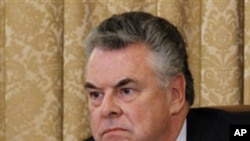Thursday’s first hearing attracted a large crowd of reporters, activists and spectators outside the hearing room, and had emotions bubbling over inside the room on Capitol Hill.
Tensions were high inside the crowed U.S House of Representatives hearing room, where Congressman King of New York hung pictures of the destruction of the September 11th terrorist attacks on the United States 10 years ago, including photos of the World Trade Center buildings in flames and the damaged Pentagon building.
Chairman King says he is driven by the desire to prevent another al-Qaida attack on the United States. "To back down would be a craven surrender to political correctness, and an abdication of what I believe to be the main responsibility of this committee, to protect America from a terrorist attack," he said.
The Republican members of the Homeland Security committee supported King for standing up to vocal criticism of the hearing from civil rights groups, Muslim advocacy groups and a number of Christian and Jewish faith leaders.
But the Democratic members of the committee strongly objected to the hearing’s narrow focus on the Muslim community and King’s stated premise that American Muslim leaders are not doing enough to cooperate with law enforcement officials. King's allegations come despite a study by Duke University and the University of North Carolina indicating that Muslim Americans have been the biggest source of tips leading to arrests in U.S. terrorism cases.
Democratic Congresswoman Sheila Jackson Lee of Texas called the hearing an outrage. One of the critics was also an invited witness, Congressman Keith Ellison of Minnesota, the first Muslim American elected to Congress. "Ascribing evil acts of a few individuals to an entire community is wrong.
The Republican chairman of the House Homeland Security Committee, Peter King, is vowing to continue to hold hearings on the controversial topic of the "radicalization of American Muslims."
It is ineffective, and it risks making our country less safe," he said.
One of the most powerful moments came as Ellison sobbed while trying to tell the story of a young Muslim paramedic who died trying to save others after the September 11th attacks. Ellison said there were hateful rumors after his death that 23-year-old Mohammed Salman Hamdani was somehow a perpetrator of the attacks because of his Muslim faith.
Congressman Keith Ellison of Minnesota:
"His life should not be defined as a member of an ethnic group or a member of a religion, but as an American who gave everything for his fellow citizens," he said.
After the hearing, King faced the cameras and vowed he would continue. "I have received nothing but support from the party leadership; I received total support. I mean, they knew where I was going when I was elected committee chairman. I made this clear that this would be a main priority of mine, and as I also said today, this is the first in a series of radicalization hearings," he said.
King said the next hearing would focus on the radicalization American Muslims in prison.
Critics of the hearings say they should have a broader scope to investigate the broad spectrum of domestic terrorism, including anti-government hate groups and white supremacists.
Muslim advocacy groups responded forcefully, saying they feel the premise behind King’s hearings is guilt by association for the entire Muslim community.
Farhana Khera is president and executive director of Muslim Advocates. She called on Americans to call out hateful rhetoric by public figures that would seek to divide Americans. "I firmly believe that we as a country have reached a tipping point. On one side is fear and division, and on the other the values that unite us as Americans," she said.
Political analyst Larry Sabato said public opinion polls show that Americans are divided over the hearings because many Americans are divided internally over this emotional issue of Muslim Americans and national security.
"On the one hand, Americans are bred to oppose discrimination, at least the modern American is, and we recoil from attempts to bash any particular group of citizens in America. On the other hand, it is obvious that we have had a number of disturbing incidents, involving Muslims in America involved in terrorist activities, some very close calls that have not happened, and some terrible incidents, like Fort Hood that have. And Americans want to get to the bottom of those and make sure they do not happen again," he said.
The hearing came after a series of high-profile incidents linked to American Muslims over the past couple of years, including a mass shooting at an army base at Fort Hood, Texas, in 2009 that killed 13 people and left 29 wounded, and a failed bombing in Times Square, New York City last year.
Asked about the hearings, White House spokesman Jay Carney said the White House welcomes congressional participation on what he called an important issue. Carney declined to criticize the focus of the hearings, but repeated comments by other Obama administration officials that "we don't believe that in America we should practice guilt by association." Carney said the focus is to reach out to members of the Muslim American community because they are part of the solution and not part of the problem.











